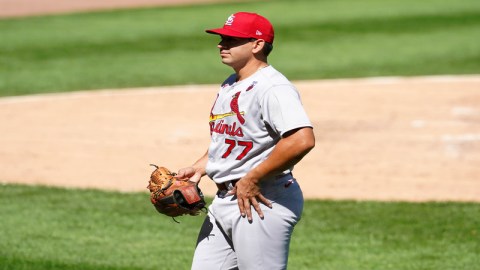Two years ago, Hall of Fame cornerback Mike Haynes made a life-altering decision — a simple one, really — that rocked his core and shook his belief system.
He was at the Pro Football Hall of Fame in the summer of 2008. Haynes, who played for the New England Patriots from 1976-82 and the Los Angeles Raiders from 1983-89, worked as a part-time NFL employee and made his annual trip to Canton, Ohio.
That day, the Hall of Fame was running a public service announcement to raise awareness for prostate cancer. The NFL was conducting free screenings for interested patrons, and they asked Haynes to participate in the event, kind of on a whim. Haynes figured he'd show his face and encourage others to take the screening, but having recently taken a physical with his primary care physician in Los Angeles, Haynes had little interest in taking a screening.
"They said if I was involved, it might encourage other people," Haynes said. "I figured I'd just be a nice guy, take the screening and help raise awareness."
Haynes' screening — which consists of paperwork, a survey, a simple blood test and a digital rectal exam — led to a conversation with the on-site doctor about Haynes' prostate-specific antigen (PSA) level, which was a 3.5. Haynes was strongly advised to speak with his doctor in California, and he started to get slightly nervous when he found out some facts about prostate cancer.
Haynes was told one in six men will be diagnosed with prostate cancer, and one in 2 1/2 African-American men will be diagnosed with the disease. According to knowyourstats.org, 192,000 men were diagnosed with prostate cancer in 2009, and more than 27,000 American men will die from the disease annually. Only skin cancer affects more men in the United States.
So Haynes went home to Los Angeles and spoke to his doctor, who compared his PSA levels from past tests. Years earlier, Haynes' PSA was in the 1s, and when he had his most recent physical about four or five months before the Hall of Fame screening, his PSA was a 3.0. Haynes' doctor determined the spike warranted a biopsy.
"When I got the biopsy, I found out that I did in fact have cancer," Haynes said. "From there, it became a challenge of trying to decide how I was going to treat it."
Haynes reached out to a number of friends who were willing to talk to him about their treatment options, and he quickly found out it was a huge mental hurdle for men to really speak about their illness.
"When I did start opening up and talking about it, which I'm finding out now is a big thing for people who deal with these health issues, I started talking to people about prostate cancer and treatment options," Haynes said. "People just came out to talk about it, and it helps you make better decisions."
Haynes chose the surgical route, and following the procedure, his doctors told him there's a 90 percent chance the cancer had been completely contained.
"We were able to get it all, but still, I don’t know that it really means I'm over it completely," Haynes said. "I still get a blood test every three months and monitor it. I'll be doing that probably for the next year, and then I'll switch from every three months to every six months and then every nine months, and then I'll be back to doing it again with my annual physical."
Now, Haynes has made it his mission to raise awareness for prostate cancer. He started working for the American Urological Association (AUA), which helped him decide over treatment options. Haynes has spoken at a number of events, including a session on Capitol Hill in Washington, D.C., and he has garnered the help of fellow Hall of Famers Tony Dorsett, Willie Lanier and Fred Biletnikoff.
First and foremost, Haynes wants to normalize the discussion of prostate cancer. He commended women for doing such a remarkable job of raising awareness for breast cancer, but men have tons of ground to make up with prostate cancer.
Haynes even said he was guilty of it himself. His grandfather died when Haynes was 20, and he didn’t find out until recently that prostate cancer was the cause of death.
"Most men don’t even know the signs of prostate cancer," Haynes said. "They don’t even know the statistics of prostate cancer, and way more men are going to get prostate cancer than women who are going to get breast cancer. It's one in eight women who will be diagnosed with breast cancer. One in six men will be diagnosed with prostate cancer, and I'd say that women have done a really great job of raising the awareness. Both men and women know about breast cancer, but men need to get educated [about prostate cancer], and that’s what we're trying to do."
Although the AUA doesn’t recommend getting a prostate exam until the age of 40, Haynes said all men should first find out if prostate cancer runs in their family, and then they should research the symptoms. Most importantly, just talk about it.
"I think of myself as a typical male," Haynes said. "I didn’t know that one in six men will be diagnosed with prostate cancer. I didn’t know that one in two-and-a-half African American men will be diagnosed with prostate cancer in their lifetime. Those are all new stats. What I started to think about was, 'Maybe everybody knows but me.'
"So I started asking different guys, and sure enough, guys were unaware. Most guys don’t even know what the prostate gland does. I have talked to guys whose father had prostate cancer, their older brother had prostate cancer, and the following year after their brother goes through it, they'd get diagnosed with it. And that guy wouldn’t even know what the prostate gland does. So, wait a minute, 'Your dad has it. Your brother has it. But you won't talk?' And they don’t. Men don’t talk. And because of that, that’s why I got involved.
"In the African American community, shoot, that’s an epidemic, but most guys don’t even know about prostate cancer. They definitely don’t even want to go in and have an exam. They need to get screened. Much like breast cancer, if you detect it early, it's treatable. That’s why the AUA asked me to be their spokesperson. I said, 'Absolutely, we need to do something about this.'"
Haynes is using his experience and celebrity status to make a real positive mark in society, and it's a subject he is noticeably passionate about. He still has no idea if he would have faced a different outcome if he wasn’t in Canton that day two years ago.
But the fact remains that Haynes was there. He got treated, survived cancer and is making it his business to help others overcome the same obstacle.
There are millions of unanswered questions about cancer, and the unknowns are what make the disease so tough to fight. With people like Haynes, though, everyone is one step closer to finding a cure.
"I'm lucky that I was there that day," Haynes said. "The NFL offers free screenings for players, and other screenings as well. It's just coincidental that I went down there because I really had no reason to go. You wonder if I had waited until my next physical, would that have made a difference? I don’t know. I don’t know the answer to that."
To learn more about prostate cancer, go to knowyourstats.org, where you can also send questions to Mike Haynes. Also, to donate to the Jimmy Fund, visit www.nesn.com/jimmy-fund or call 877-738-1234.



